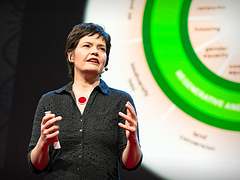Una economía saludable debe diseñarse para prosperar, no para crecer
"I wrote Doughnut Economics: Seven Ways to Think Like a 21st-Century Economist to be the book that I wish I could have read when I was a frustrated and disillusioned economics student myself. And silly though it sounds, it all starts with a doughnut (yes, the kind with a hole in the middle), which acts as a compass for 21st-century prosperity, inviting us to rethink what the economy is, and is for, who we are, and what success looks like."
Kate Raworth
at
TED2018
A healthy economy should be designed to thrive, not grow
What would a sustainable, universally beneficial economy look like? "Like a doughnut," says Oxford economist Kate Raworth. In a stellar, eye-opening talk, she explains how we can move countries out of the hole -- where people are falling short on life's essentials -- and create regenerative, distributive economies that work within the planet's ecological limits.
Kate Raworth is passionate about making economics fit for the 21st century.
Why you should listen
Kate Raworth writes: "I am a renegade economist, dedicated to rewriting economics so that it's fit for tackling the 21st century's grand challenge of meeting the needs of all people within the means of the planet. After 20 years of wrestling with policies based on outdated economic theories -- via the villages of Zanzibar to the headquarters of the UN and on the campaigning frontlines of Oxfam -- I realized that if the economic conversations taking place in parliaments, in boardrooms and in the media worldwide are going to change, then the fundamental economic ideas taught in schools and universities have to be transformed, too."I wrote Doughnut Economics: Seven Ways to Think Like a 21st-Century Economist to be the book that I wish I could have read when I was a frustrated and disillusioned economics student myself. And silly though it sounds, it all starts with a doughnut (yes, the kind with a hole in the middle), which acts as a compass for 21st-century prosperity, inviting us to rethink what the economy is, and is for, who we are, and what success looks like."
